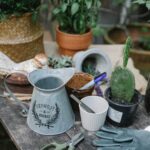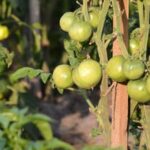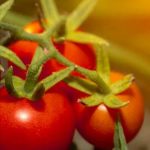Container gardening has become increasingly popular, especially for individuals looking to grow their own fresh produce in limited spaces. When it comes to cultivating vegetables in containers, choosing the best soil mix is crucial for success. In this article, we will explore the essentials of container vegetable gardening and provide insights into selecting the most appropriate soil for your plants.
Container gardening offers a multitude of benefits, such as flexibility in placement, better control over soil conditions, and the ability to overcome poor soil quality. By understanding the basics of container gardening, including proper soil selection, gardeners can create thriving vegetable gardens even in small urban settings or balconies. The key to a productive container garden lies in providing your plants with nutrient-rich soil that supports healthy growth and development.
When it comes to choosing the right containers for your vegetable garden, factors such as size, material, and drainage play a crucial role in plant health and overall yield. However, without the right soil mix specifically formulated for container gardening, even the most well-designed containers may not yield optimal results. In the following sections, we will delve into selecting the best soil mix for container vegetable gardening to ensure your plants have a solid foundation for success.
Benefits of Vegetable Gardening in Containers
Container gardening offers numerous benefits for those looking to grow their own vegetables. One of the main advantages is the ability to have a garden in limited spaces, such as balconies, patios, or even windowsills. This makes it ideal for urban dwellers or those with small yards. By utilizing containers, individuals can make the most of the available space and still enjoy the satisfaction of harvesting their own fresh produce.
Another perk of vegetable gardening in containers is the increased control over soil quality. It allows gardeners to choose the best soil mix specifically tailored to the needs of their plants. This is especially beneficial for those living in areas with poor soil quality or drainage issues. By using high-quality soil mixtures, container gardeners can provide their plants with the nutrients they need for healthy growth and abundant harvests.
Furthermore, container gardening offers portability and versatility. Containers can be moved around to optimize sunlight exposure or protect plants from harsh weather conditions. This flexibility also allows gardeners to experiment with different plant varieties and arrangements without committing to a permanent garden layout. Overall, vegetable gardening in containers provides an accessible and convenient solution for anyone seeking to cultivate their own fresh produce at home.
Choosing the Right Containers
When it comes to container vegetable gardening, choosing the right containers is essential for the success of your plants. The size, material, and drainage of the containers you select can greatly impact the growth and health of your vegetables.
Size Matters
The size of your container will depend on the type of vegetable you plan to grow. Larger vegetables like tomatoes or peppers will require bigger containers to accommodate their root systems and allow for proper growth. Smaller vegetables like herbs or lettuce can thrive in smaller containers. It’s important to consider the mature size of the plant when selecting the size of your container.
Material Selection
Containers come in a variety of materials, each with their own benefits and drawbacks. Terracotta pots are porous and allow for good air circulation but can dry out quickly. Plastic pots are lightweight and retain moisture well but may not be as breathable as other materials. Consider factors like durability, weight, and aesthetics when choosing the material for your containers.
Proper Drainage
One of the most crucial aspects of container gardening is ensuring proper drainage to prevent waterlogged soil which can lead to root rot. Make sure your containers have drainage holes at the bottom to allow excess water to escape. Elevating your containers slightly off the ground can also help with drainage. Additionally, using a layer of rocks or gravel at the bottom of your container can improve drainage and prevent water from pooling around the roots.
Choosing the right containers for your vegetable garden is an important step in setting yourself up for success. Consider factors like size, material, and drainage when selecting containers for your plants to ensure they have everything they need to thrive and produce a bountiful harvest.
Selecting the Best Soil Mix for Container Vegetable Gardening
Container vegetable gardening requires a suitable soil mix to ensure the healthy growth of plants. The best soil mix for container gardening should be well-draining, moisture-retentive, and rich in nutrients. A good quality potting mix specially formulated for containers is often the ideal choice. These mixes are typically lightweight and sterile, reducing the chances of pests and diseases harming your plants.
One key component of a good soil mix for container vegetable gardening is peat moss or coir, which helps retain moisture while also providing aeration to the roots. Additionally, perlite or vermiculite can be added to improve drainage and prevent compaction. A balanced blend of organic matter such as compost or aged manure is essential for supplying nutrients to the plants throughout their growth cycle.
When selecting the best soil mix for your container vegetables, be mindful of the specific needs of each plant variety you intend to grow. Some vegetables may require a slightly different pH level or nutrient composition in the soil. Conducting a simple soil test can help you determine if any amendments are necessary to optimize your growing medium for successful container gardening.
| Key Components | Benefits |
|---|---|
| Peat Moss or Coir | Retains moisture and provides aeration |
| Perlite or Vermiculite | Improves drainage and prevents compaction |
| Balanced Blend of Organic Matter | Supplies nutrients throughout growth cycle |
By investing time in selecting and preparing the best soil mix for your container vegetables, you set yourself up for a bountiful harvest. Remember to regularly monitor the moisture levels and overall health of your plants to make any necessary adjustments along the way. With proper care and attention to detail in soil selection, your container vegetable garden can thrive and provide you with fresh produce right at your fingertips.
Essential Tools and Supplies for Successful Container Gardening
When starting a container vegetable garden, having the right tools and supplies can make all the difference in the success of your crops. From planting to maintaining your plants, here are some essential items you’ll need to ensure a thriving garden:
- Containers: Choosing the right containers is crucial for the health of your plants. Opt for pots or containers that have drainage holes to prevent waterlogging and root rot. Additionally, consider the size of the container based on the mature size of the vegetable you plan to grow.
- Soil Mix: The best soil mix for container vegetable gardening is one that is well-draining yet moisture-retentive. A good potting mix specifically designed for vegetables will provide the necessary nutrients for healthy growth.
- Gardening Gloves: Protecting your hands while working in the garden is essential. Invest in a good pair of gardening gloves to shield your hands from cuts, blisters, and thorns.
Having these basic tools and supplies on hand will set you up for success in container gardening. It’s important to have everything ready before you start planting to make sure your plants get off to a strong start and thrive throughout the growing season. Remember that investing in quality tools and supplies will pay off in healthier plants and bountiful harvests.
Now that you have gathered all the necessary tools and supplies, you are well on your way to a successful container vegetable garden. With proper care and attention, your plants will flourish and provide you with fresh produce throughout the season. In the next section, we will discuss the best vegetables to grow in containers – perfect for beginners looking to kickstart their container gardening journey.
Best Vegetables to Grow in Containers
When starting a container vegetable garden, it is important to choose the right vegetables that thrive in such conditions. For beginners, selecting the best vegetables to grow in containers can make a significant difference in the success of their gardening venture. Some of the top picks for beginners include tomatoes, peppers, lettuce, and herbs.
Tomatoes are one of the most popular choices for container vegetable gardening due to their versatility and variety. With proper support and regular watering, tomatoes can thrive in containers producing fresh and flavorful fruits. Peppers, on the other hand, are also well-suited for container gardening as they do not require a lot of space and offer a range of colors and flavors to enjoy.
Lettuce is another excellent choice for beginners as it is quick-growing and does not require deep containers. With a variety of leaf shapes and textures available, lettuce can be easily grown in containers providing a fresh supply of salad greens throughout the growing season.
Additionally, herbs such as basil, cilantro, and parsley are ideal for container vegetable gardening as they add flavor to dishes while requiring minimal care and maintenance. Choosing these top vegetables for container gardening can ensure a successful and rewarding experience for beginners looking to grow their own produce at home.
Tips for Watering, Fertilizing, and Tending to Container Vegetables
Container vegetable gardening requires a bit more attention when it comes to watering, fertilizing, and overall care compared to traditional in-ground gardening. Properly tending to your container vegetables will ensure healthy growth and bountiful harvests. Here are some tips to help you successfully maintain your container garden:
Watering Techniques
One of the most critical aspects of caring for container vegetables is ensuring they receive adequate water. Containers can dry out quickly, especially during hot summer days. It is essential to monitor the moisture levels in the soil regularly and adjust your watering schedule accordingly. As a general rule of thumb, water when the top inch of soil feels dry to the touch. Avoid overwatering, as this can lead to root rot and other problems.
Fertilizing Guidelines
Container vegetables require regular fertilization to thrive since nutrients can quickly leach out of the confined space. Choose a balanced fertilizer specifically formulated for vegetables and follow the instructions on the package for application rates. Generally, it’s recommended to fertilize every 2-4 weeks during the growing season. Consider using organic fertilizers or compost tea for a more natural approach to feeding your plants.
Tending and Maintenance
In addition to watering and fertilizing, regular maintenance tasks are essential for healthy container vegetables. Keep an eye out for pests such as aphids, mites, or caterpillars, which can quickly damage your plants. Remove any damaged or diseased leaves promptly to prevent the spread of disease. Prune as needed to promote optimal plant growth and air circulation. Regularly check for signs of nutrient deficiency or stress in your plants and take corrective actions promptly.
By following these tips for watering, fertilizing, and tending to your container vegetables, you can enjoy a successful harvest throughout the growing season. With proper care and attention, your container vegetable garden can thrive and provide you with fresh produce right at your fingertips.
Troubleshooting Common Issues in Container Gardening
When it comes to container gardening, dealing with pests and diseases is a common challenge that many gardeners face. However, with the right knowledge and proactive measures, you can effectively troubleshoot these issues and prevent them from wreaking havoc on your precious plants. Here are some tips and strategies for controlling pests and diseases in your container vegetable garden:
- Identify the Pests: One of the first steps in pest control is identifying the culprits that are causing damage to your plants. Keep an eye out for common pests such as aphids, spider mites, caterpillars, and slugs. Inspect your plants regularly to catch any signs of infestation early on.
- Natural Remedies: Instead of reaching for harsh chemical pesticides, consider using natural remedies to combat pests in your container garden. For example, introducing beneficial insects like ladybugs or lacewings can help control aphid populations. Neem oil spray is also effective in treating a variety of pest issues.
- Disease Prevention: To prevent diseases from infecting your container-grown vegetables, practice good hygiene habits such as sanitizing your tools and containers regularly. Avoid overhead watering, as damp foliage can promote fungal growth. Choose disease-resistant varieties when possible to reduce the risk of infection.
In addition to pest control and disease prevention strategies, it’s essential to create a healthy growing environment for your container vegetables. Make sure to provide adequate sunlight, water consistently (without overwatering), and fertilize regularly with a balanced fertilizer suitable for container gardening. By following these tips and staying vigilant in monitoring your plants’ health, you can enjoy a thriving container vegetable garden free from common issues like pests and diseases.
- Pest Identification is Key
- Consider Natural Remedies
- Practice Disease Prevention
Success Stories and Inspiration
Container vegetable gardening has become increasingly popular among both seasoned gardeners and beginners looking to add a touch of greenery to their living spaces. The ability to grow fresh produce in limited spaces, such as balconies, patios, or windowsills, has revolutionized the way we approach gardening. With the right containers, soil mix, and care, anyone can enjoy a bountiful harvest of homegrown vegetables.
One of the key elements of successful container vegetable gardening is using the best soil mix for your plants. A well-draining, nutrient-rich soil is essential for healthy root development and robust growth. By choosing a high-quality potting mix specifically formulated for container gardening, you can provide your plants with the necessary nutrients and support they need to thrive. Additionally, adding organic matter like compost can further enrich the soil and promote better plant health.
Real-life success stories from passionate container gardeners serve as inspiration for those looking to start their own vegetable gardens in containers. From lush tomato plants flourishing in hanging baskets to vibrant salad greens growing in window boxes, these gardens showcase the endless possibilities of container gardening.
By learning from experienced growers and experimenting with different techniques, you can create your own stunning container vegetable garden that not only looks beautiful but also provides you with an abundant harvest of fresh produce. Whether you’re a beginner or a seasoned gardener, container vegetable gardening offers a rewarding and enjoyable way to connect with nature and nourish your body with homegrown goodness.
Frequently Asked Questions
What Soil Is Best for Growing Vegetables in Containers?
The best soil for growing vegetables in containers is a high-quality potting mix that is lightweight, well-draining, and rich in organic matter. This type of soil provides the right balance of nutrients for vegetable plants to thrive in a confined space.
What Is the Best Soil for Vegetable Gardens?
In traditional vegetable gardens, the best soil is one that is loamy and well-draining, with a pH level close to neutral. This type of soil allows roots to easily penetrate and access nutrients while also retaining moisture for sustained growth throughout the season.
What Is the Best Soil Mixture for Container Gardens?
The best soil mixture for container gardens is a combination of potting soil, compost, and perlite or vermiculite. This blend provides good drainage, aeration, and nutrient retention essential for healthy plant growth in containers with limited space. Mixing these components in the right proportions can help optimize growing conditions for plants in containers.

If you’re looking to get into vegetable gardening, or are just looking for some tips on how to make your current garden better, then you’ve come to the right place! My name is Ethel and I have been gardening for years. In this blog, I’m going to share with you some of my best tips on how to create a successful vegetable garden.





